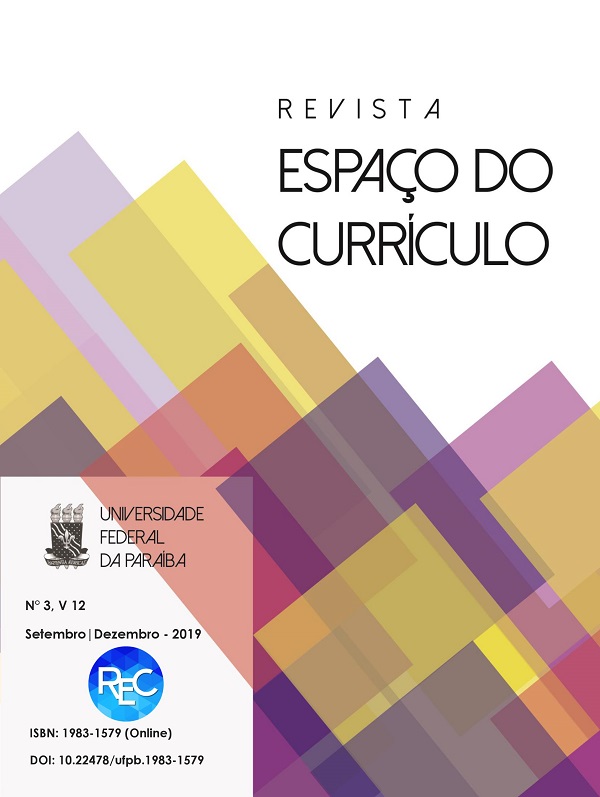ADAPT, FIT, DIFFERENTIATE
reflections from the curricular policies for the target audience of Special Education
DOI:
https://doi.org/10.22478/ufpb.1983-1579.2019v12n3.40581Keywords:
Resume, Adaptation, curricular adequacy and differentiationAbstract
This article aims to investigate how in the set of documents that we are naming as curricular policies, especially five curricular texts created after the National Special Education Policy in the perspective of Inclusive Education, in 2008, have been showing curricular movements such as adaptation, adaptation or curricular differentiation as ways of including the target audience of Special Education. The methodological development of this work took place through documentary research, investigating some of the political texts that refer to these movements and that advocate the defense of a certain term as an inclusion process. This research was part of the project entitled “Schooling of students with intellectual disabilities: public policies, cognitive processes and learning assessment” which sought to investigate the forms of schooling of students with intellectual disabilities inserted in the regular classroom and in Specialized Educational Services. This discussion, therefore, is a deepening of the curriculum issues present in the project. The analysis of the curricular policies carried out in this article identified that there is little evidence of curricular movements of adaptation, flexibility and / or curricular differentiation as possibilities for the inclusion of students targeting Special Education. According to the attentive reading, through the researched curriculum policies, the types of curricular movements considered here are not represented as effective forms of possibility of pedagogical work for the target audience of Special Education.
Downloads
Metrics
References
BOER, Wania Aparecida. Adequações curriculares na área da deficiência intelectual: análise de uma realidade. 2012. Dissertação (Mestrado em Educação) – Universidade Federal de São Carlos. São Carlos, SP, 2012.
HEREDERO, Eladio Sebastian. A escola inclusiva e estratégias para fazer frente a ela: as adaptações curriculares. Acta Scientiarum Education. v. 32. n. 2. 2010.
LUNARDI-MENDES, Geovana Mendonça. Projeto “Escolarização de alunos com deficiência intelectual: políticas públicas, processos cognitivos e avaliação da aprendizagem”. 2013. 10f. (Texto digitado).
MESQUISTA, Amélia. Vozes ausentes: o currículo e a proposta de educação inclusiva. Revista Eletrônica de Educação. v. 3. n. 1. mai. 2009.
______. Currículo e educação inclusiva: as políticas curriculares nacionais. Espaço do Currículo. v. 3. n. 1. 2010.
MOSCARDINI, Saulo Fantato. Escolarização de alunos com deficiência intelectual em classes comuns e em salas de recursos multifuncionais. 2011. Dissertação (Mestrado em Educação) – Universidade Estadual Paulista Júlio de Mesquita Filho. Araraquara, SP, 2011.
PACHECO, José. Notas sobre diversificação/diferenciação curricular em Portugal. InterMeio: Revista do Programa de Pós-Graduação em Educação. Campo Grande: MS. v. 14. n. 28. p. 178-187. jul./dez. 2008.
ROLDÃO, Maria do Céu. Diferenciação Curricular Revisitada: conceito, discurso e práxis. Porto, PT: Porto Editora, 2003.
SACRISTÁN, Gimeno. O currículo: uma reflexão sobre a prática. Tradução Ernani F. da F. Rosa. 3. ed. Porto Alegre: ArtMed, 2000.
SILVA, Fabiany Cássia Tavares da; LUNARDI-MENDES, Geovana Mendonça. Currículo e conhecimento escolar na contemporaneidade: desafios para a escolarização de sujeitos com deficiência. Arquivos Analíticos de Políticas Educativos. v. 22. n. 80. 2014.
VIERA, Alexandre Braga. Currículo e educação especial: as ações a partir de diálogos cotidianos. 2012. Tese (Doutorado em Educação) – Universidade Federal do Espírito Santo, Vitória, 2012.
FONTES DOCUMENTAIS
ARANHA, Maria Salete Fábio. Projeto Escola Viva: garantindo o acesso e permanência de todos os alunos na escola: necessidades educacionais especiais dos alunos. Brasília: Ministério da Educação, Secretaria de Educação Especial, 2005.
BRASIL. (2008). Ministério da Educação. Política Nacional de Educação Especial na Perspectiva da Educação Inclusiva. Brasília: MEC/SECADI.
BRASIL. (2009a). Decreto n.º 6.949, de 25 de agosto de 2009, promulga a Convenção Internacional sobre os Direitos das Pessoas com Deficiência - ONU. Diário Oficial da União, Brasília.
BRASIL. (2009b). Ministério da Educação/CNE. Resolução 04, de 02 de outubro de 2009. Institui diretrizes operacionais para o atendimento educacional especializado na Educação Básica, modalidade Educação Especial.
BRASIL. (2010). Resolução CNE/CEB n.º 04, de 13 de junho de 2010. Define Diretrizes Curriculares Nacionais Gerais para Educação Básica.
BRASIL. (2011). Ministério da Educação. Decreto n.º 7.611, de 17 de novembro de 2011. Dispõe sobre a educação especial, o atendimento educacional especializado e dá outras providências.
ONU. (2006). Convenção sobre os Direitos das Pessoas com Deficiência, aprovada pela Assembleia Geral da ONU em dezembro de 2006. Disponível em: Acesso em 8 julho de 2016.
UNESCO. (1994) Declaração de Salamanca: Sobre Princípios, Políticas e Práticas na Área das Necessidades Educativas Especiais: Salamanca: Espanha.
WCEFA. (1990). Conferência Mundial de Educação Para Todos. Declaração mundial sobre educação para todos e Plano de ação para satisfazer as necessidades básicas de aprendizagem. Jomtien, Tailândia: março de 1990.
Downloads
Published
How to Cite
Issue
Section
License
By submitting an article to Curriculum Space Journal (CSJ) and having it approved, the authors agree to assign, without remuneration, the following rights to Curriculum Space Journal: first publication rights and permission for CSJ to redistribute this article. article and its metadata to the indexing and reference services that its editors deem appropriate.
















